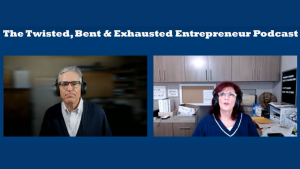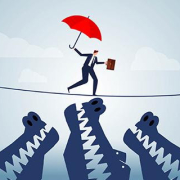Start Smart, Scale Fast: The Foundation Every Entrepreneur Needs
If you’ve ever dreamed of starting your own business—or if you’re already knee-deep in it—you probably know it’s a bit like jumping into the deep end without checking if the pool has water. The excitement is real, but so is the risk of smacking your head on the bottom if you don’t prepare.
After nearly 20 years helping entrepreneurs build businesses that don’t run them ragged, I’ve seen what works and what definitely doesn’t. Let’s get one thing straight: success isn’t about flashy logos, shiny websites, or endless social media posts. It’s about laying a rock-solid foundation from day one.
Here are the 10 absolutely essential steps you need to take if you want your business to survive—and thrive—without driving you crazy.
 1️⃣ Nail Your Idea & Value Proposition
1️⃣ Nail Your Idea & Value Proposition
Before you spend a dime, answer these questions:
- What problem are you solving?
- Who exactly has this problem (your ideal customer)?
- Why would they pay you instead of doing it themselves or choosing someone else?
If you can’t answer these three questions clearly, you don’t have a business—just a hobby with invoices.
2️⃣ Do Basic Market Research
This doesn’t mean you need a 100-page MBA report. But you do need to know:
- Who your competitors are and what they do well (and poorly).
- Whether people will actually buy your product or service at the price you need to make a profit.
- What makes you different—because if you’re just like everyone else, you’ll fight for scraps.
3️⃣ Choose a Legal Structure & Register
You can’t just call yourself a business because you printed some business cards. Choose your legal entity (LLC, corporation, or sole proprietorship), get your business license, register for an EIN, and secure any local permits. This step protects you legally and builds credibility with clients.
4️⃣ Set Up Financial Systems Early
Trust me—nothing sinks new businesses faster than a cash flow mess. Open a separate business bank account so you don’t commingle funds. Get basic accounting software or hire a bookkeeper. Know your expenses and set prices that ensure a healthy profit margin—guessing will leave you broke.
5️⃣ Document Your Core Processes
This is the step nearly every entrepreneur skips. Why? Because it’s boring. But guess what? If everything lives in your head, you’re the bottleneck—and you’ll never be able to delegate or grow. Write down simple, repeatable procedures for how you:
- Make sales
- Deliver services or products
- Handle client communication
- Manage billing and payments
This is how you build a business that can run without you being there every minute of every day.
6️⃣ Create a Minimal Online Presence
You don’t need a $20,000 website, but you do need a professional one. Here’s what’s non-negotiable:
- A branded domain name and matching email (no more yourbusiness@gmail.com).
- A basic website that clearly says who you help, what you do, and how to get in touch.
- A Google Business Profile if you have local clients—because that’s how people find you.
 7️⃣ Plan & Execute a Sales Strategy
7️⃣ Plan & Execute a Sales Strategy
This step separates dreamers from doers. You need a plan for how you’ll get your first paying clients—and you need to work it every single week. Whether it’s networking, outreach, ads, partnerships, or asking for referrals, consistent sales activity is the lifeblood of your business.
8️⃣ Deliver Outstanding Service
Great marketing might get you your first clients, but great service is what will keep them coming back—and raving about you to everyone they know. Have a plan for how you’ll deliver what you promised, when you promised it. The fastest way to grow? Turn clients into your best marketing team.
9️⃣ Insure & Protect Your Business
Don’t skip this. Get insurance appropriate to your business (general liability, professional liability, workers’ comp, etc.). If you provide services, use contracts that spell out exactly what you will—and won’t—do, and what each party’s rights and responsibilities are.
🔟 Commit to Ongoing Improvement
Even after you launch, you’re not done. Schedule regular reviews of your finances, operations, and marketing. Look at what’s working, what’s not, and adjust. Keep learning—read books, join groups, or hire a coach—because the world moves fast, and businesses that don’t adapt get left behind.
Bonus: Discipline is Your Secret Weapon
The difference between successful entrepreneurs and wannabes isn’t intelligence, luck, or a giant bank account. It’s the discipline to do these boring but necessary things, day in and day out, especially when it’s uncomfortable.
Too Many Decisions? Overwhelmed at the Thought?
You don’t have to do this alone. At Concierge Business Solutions®, we’ve helped hundreds of entrepreneurs build businesses that don’t just survive—but give them the freedom they dreamed of when they first took the leap.
Whether you need help refining your idea, setting up your systems, pricing for profit, documenting your processes, or planning your sales strategy, our business coaching services are here to guide you every step of the way.
Let us help you build a business that doesn’t chain you to your desk 24/7. One that runs smoothly, supports your life, and gives you the freedom you deserve.
📅 Schedule your free consultation today at Book with Me
or
📧 Email me directly at LSpoor@conciergebusinesssolutions.com
Or, if you already have this foundation in place—like the edges of a puzzle—let us help you put the middle pieces together so you can build a business that truly runs without you. Our Freedom by Design course gives you step-by-step guidance to operational independence, with practical systems and strategies you can implement right away.
Let’s turn your dream into a business that works for you—not the other way around.



 You don’t have to build these systems alone—and you definitely don’t need to manage them on sticky notes or random spreadsheets. That’s why I created Essential Elements™, our powerful
You don’t have to build these systems alone—and you definitely don’t need to manage them on sticky notes or random spreadsheets. That’s why I created Essential Elements™, our powerful  Every day you operate without documented processes is another day you’re stuck playing whack-a-mole with problems that shouldn’t even exist. Essential Elements™ makes documentation easy by turning what you do into repeatable, teachable systems—and giving you the power to automate, delegate, and scale.
Every day you operate without documented processes is another day you’re stuck playing whack-a-mole with problems that shouldn’t even exist. Essential Elements™ makes documentation easy by turning what you do into repeatable, teachable systems—and giving you the power to automate, delegate, and scale.



 And trust me, you’re not alone. We’ve ALL been there. Most entrepreneurs start as the technician, the doer, the magic-maker. But when you’re running the whole circus? Burnout is inevitable. You’re not building a business—you’re building a hamster wheel.
And trust me, you’re not alone. We’ve ALL been there. Most entrepreneurs start as the technician, the doer, the magic-maker. But when you’re running the whole circus? Burnout is inevitable. You’re not building a business—you’re building a hamster wheel.

 Running a business without a plan is a lot like trying to drive cross-country without GPS. You might eventually get there, but you’ll take wrong turns, waste time, burn fuel, and end up a whole lot more stressed than you needed to be.
Running a business without a plan is a lot like trying to drive cross-country without GPS. You might eventually get there, but you’ll take wrong turns, waste time, burn fuel, and end up a whole lot more stressed than you needed to be.



 Retainer Client Management: Automate recurring invoices, track hours, and stop manually calculating your monthly service clients.
Retainer Client Management: Automate recurring invoices, track hours, and stop manually calculating your monthly service clients. We know switching systems can feel overwhelming. But trust us, once you see what Essential Elements™ can do, you’ll wonder how you ever lived without it. That’s why we’re making it easier than ever to take the plunge.
We know switching systems can feel overwhelming. But trust us, once you see what Essential Elements™ can do, you’ll wonder how you ever lived without it. That’s why we’re making it easier than ever to take the plunge.
 We’ve always been proud of our team, but we wanted to do more to show our appreciation. This year, we introduced two new benefits: leased company cars and health care coverage.
We’ve always been proud of our team, but we wanted to do more to show our appreciation. This year, we introduced two new benefits: leased company cars and health care coverage.
